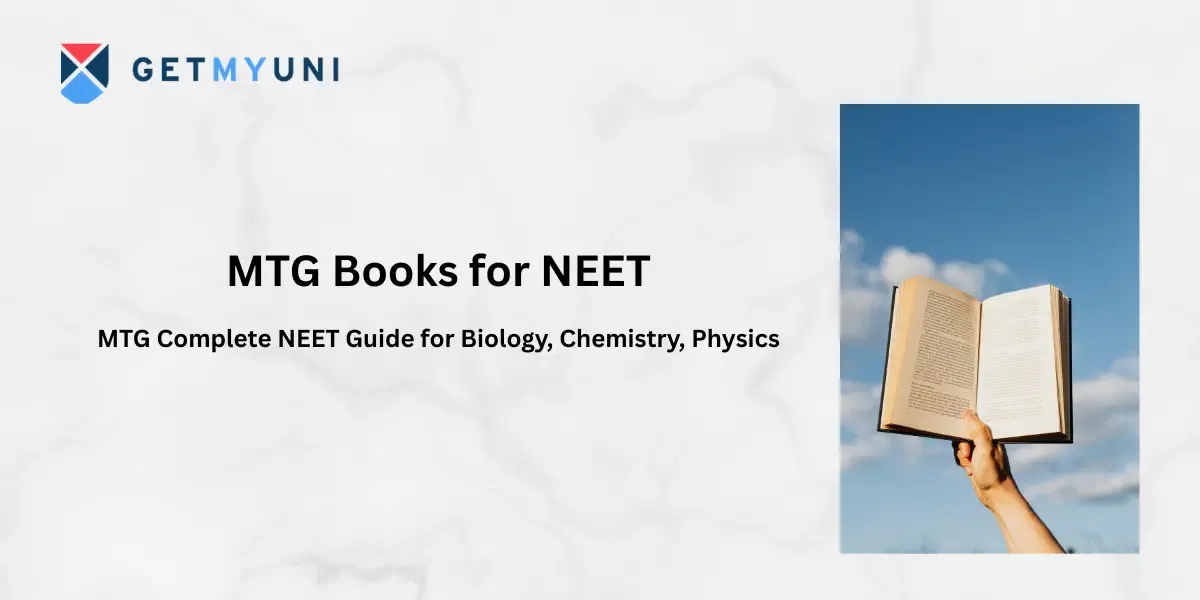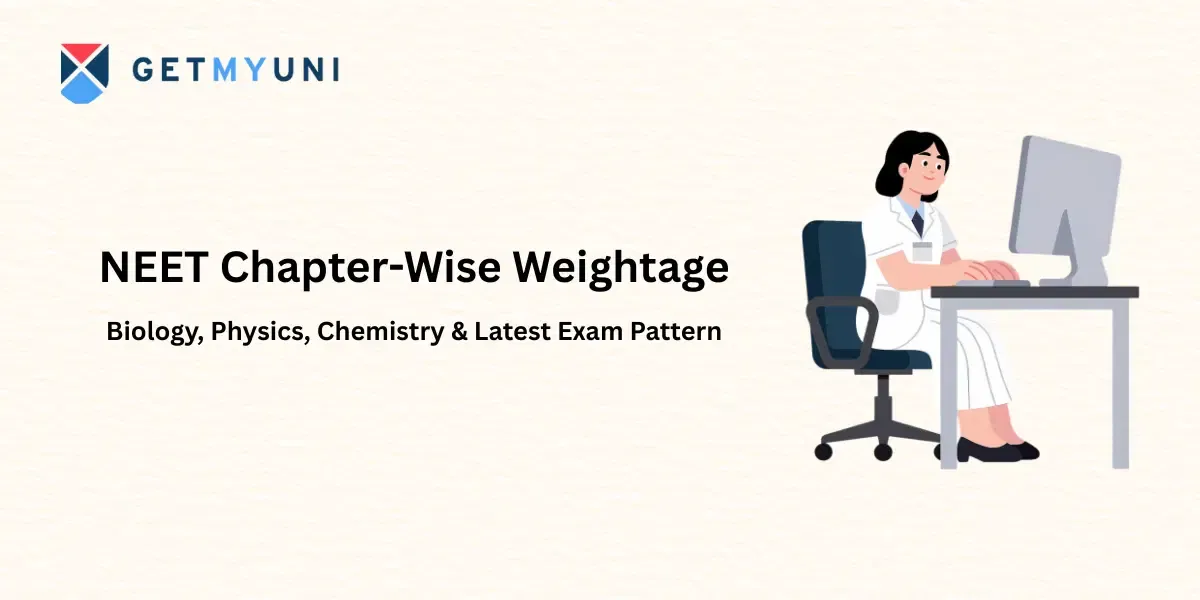To prepare for NEET from class 11, it is important for the candidates to make a study plan, create a timetable, avoid distractions, set practical goals and study and revise the chapters on a daily basis.
To prepare for NEET from Class 11, focus on building strong fundamentals in Physics, Chemistry, and Biology, follow the NCERT syllabus thoroughly, make a consistent study schedule, practice MCQs regularly, and revise frequently to strengthen concepts.
The NEET syllabus has parity with the syllabi of classes 11 and 12. Creating a timetable for daily preparation and revision, setting daily targets, and following the NCERT books thoroughly, are few of the tips that the students must follow from the beginning to crack the NEET exam.
NEET is a medical entrance exam that is conducted by the National Testing Agency (NTA) in the PBT or pen and paper based mode. This test is conducted once every year. NEET 2025 is scheduled on May 4, 2025.
Class 11 concepts are the foundations of most class 12 topics. NEET books contribute to 90% of NEET questions directly.
Roadmap To Prepare For NEET Exam From Class 11
Your study time should match the subject weightage: 45% for Biology and 27.5% each for Physics and Chemistry. Practising with previous year's questions will help you understand the NEET exam pattern better and to prepare for NEET from Class 11 effectively.
Make it a habit to solve 30 MCQs daily from each subject. This practice builds your speed and accuracy - two crucial skills for NEET success.
Keep separate notebooks handy for formulas and important concepts from each subject.
Why Class 11 is Perfect for NEET Preparation?
Class 11 provides an ideal foundation for NEET preparation due to several key advantages. With a relatively lighter academic schedule compared to Class 12, students have more time to grasp fundamental concepts thoroughly.
This strong conceptual base becomes invaluable when tackling advanced topics later.
Also Check: NEET Preparation Time Table 2025
Understanding NEET Exam Pattern
The NEET 2025 exam will feature 180 multiple-choice questions. Students face 45 questions each from Physics and Chemistry, while Biology has 90 questions. A correct answer gets you 4 marks, but wrong answers lead to a 1-mark deduction.
Important Physics Concepts
Physics forms the foundations of NEET preparation and get better understanding to prepare for NEET from class 11.
These key areas need your attention:
| Unit | Key Topics |
| Mechanics | Kinematics, Laws of Motion, Work-Energy |
| Thermodynamics | Heat Transfer, Laws of Thermodynamics |
| Waves & Sound | Wave Motion, Doppler Effect |
| Optics | Ray Optics, Wave Optics |
| Modern Physics | Photoelectric Effect, Nuclear Physics |
Must Know Chemistry Chapters
A systematic understanding of Chemistry's three main branches will help you succeed:
| Section | Important Topics |
| Physical Chemistry | Chemical Kinetics, Thermodynamics, Electrochemistry, Solutions |
| Organic Chemistry | Hydrocarbons, Alcohols and Ethers, Aldehydes and Ketones, Biomolecules |
| Inorganic Chemistry | Periodic Properties, Chemical Bonding, Coordination Compounds, d & f Block Elements |
Biology Topics To Focus On
Biology carries the highest weightage in NEET. These fundamental concepts need your attention:
| Category | Essential Topics |
| Zoology | Human Physiology, Animal Kingdom |
| Botany | Plant Kingdom, Plant Physiology |
| Genetics | Inheritance, Evolution |
| Cell Biology | Cell Structure, Cell Division |
| Ecology | Ecosystem, Biodiversity |
Also Check: How to prepare for NEET 2025 in 2 Months
An Overview of NEET 2025
NEET is the National Eligibility cum Entrance Test that is conducted by the National Testing Agency (NTA) for the admission of candidates to the medical colleges in the country.
Once students are aware of how to Prepare for NEET from Class 11, they must check out the overview of the exam tabulated below.
| Particulars | Details |
| Name of the Exam | National Eligibility cum Entrance Test (NEET) |
| Conducting Authority | National Testing Agency (NTA) |
| Mode of Exam | Pen and Paper Based Test (PBT) |
| Duration of Exam | 3 Hours 20 Minutes |
| Subjects | Physics, Chemistry, Biology (Botany + Zoology) |
| Total Number of Questions | 200 |
| Number of Questions to be Attempted | 180 |
| Number of Questions Section-Wise | Physics - 45; Chemistry - 45; Botany - 45; Zoology - 45 |
| Question Type | Multiple Choice Questions |
| Marking Scheme | +4 Marks for Correct Answers, -1 Mark for Incorrect Answers |
Also Read: How to Crack NEET Exam?
Smart Study Techniques For Better Results Without Coaching
The right study techniques can make a huge difference in your NEET preparation trip. Let's look at proven methods that will improve your learning and boost your performance and to prepare for NEET from class 11effectively.
Note-Taking Methods
The Cornell Method stands out as the quickest way to take notes for NEET preparation. Here's how to apply it:
| Section | Purpose | Tips |
| Cue Column (2.5") | Keywords & Questions | Write formulas, definitions |
| Notes Column (6") | Detailed Information | Main concepts, examples |
| Summary (2" bottom) | Quick Review | Chapter overview |
Your notes will work better if you:
- Use color coding for different concepts - red for formulas, blue for definitions
- Create visual aids like diagrams and flowcharts for complex topics
- Keep separate notebooks for each subject
You should blend your notes by combining simple elements in fewer words. This helps you learn concepts quickly during revision sessions.
Practice Test Strategies
The Mock tests are the life-force of NEET preparation. These approaches have been proven to help:
- Time Management
- Solve papers within 190 minutes (10 minutes less than actual exam duration)
- Break down syllabus into high-yielding topics
- Give specific time slots to individual sections
- Performance Analysis
- Review mistakes after each mock test
- Track progress using an effort mirror
- Target weak areas through focused practice
Your practice sessions will work better if you:
- Start mock tests 6-8 months before the exam
- Begin with Daily Practice Problems (DPP) from day one
- Stay honest during practice tests for accurate assessment
A careful analysis of your scorecard after each test helps identify answer patterns and prevents repeated mistakes. You should also create a well-laid-out revision plan that has daily, weekly, and monthly reviews.
The best results come from solving previous years' papers under exam-like conditions. This makes you familiar with question patterns and builds confidence for the actual examination.
Also Read: The Perfect NEET 2025 Timetable to Secure 700+
Essential Resources to Begin With
NCERT books are the life-blood of NEET preparation. Statistics show that 90% of questions come directly from these textbooks. Your success starts with the right study materials.
Here's a detailed breakdown of essential resources:
| Resource Type | Purpose | Key Benefits |
| NCERT Books | Core Concepts | Covers entire NEET syllabus |
| Reference Books | Advanced Learning | Rich with complex concepts |
| Practice Papers | Self-Assessment | Regular testing environment |
Your handwritten notebooks for each subject will help you retain and understand concepts better during classroom sessions.
These additional resources will strengthen your preparation:
- Online Learning Platforms
- Video lectures from experienced educators
- Interactive study modules
- Regular assessment tools
- Test Series
- Weekly practice papers
- Monthly assessments
- Performance analysis reports
- The Right Resources that line up with your learning style are vital to success.
Educational YouTube channels and subject-specific video lectures can fill knowledge gaps and explain complex topics differently. These extra materials work great for self-study.
Stress management is a vital part of NEET preparation. A mentor can help you maintain balance throughout your learning experience. Smart use of these resources, combined with regular practice and dedication, builds a resilient foundation for NEET success.
Also Read: Tips to Score 700+ marks in NEET 2025
Effective Time Management Tips
Time management is a crucial skill you need to develop for a successful NEET preparation. A well-organised study schedule helps you get the best results without feeling stressed.
Creating Weekly Schedules
Here's a balanced timetable to structure your week:
| Time Slot | Activity | Duration |
| Morning | School/Self Study | 6-7 hours |
| Afternoon | Rest/Homework | 2-3 hours |
| Evening | NEET Preparation | 3-4 hours |
| Night | Revision/Practice | 1-2 hours |
Balancing School and NEET Prep
You need to find the right balance between your regular studies and entrance exam prep:
- Morning Study Sessions
- Finish school assignments first
- Go through previous day's concepts
- Work on numerical problems
- Review formulas and definitions
- Evening NEET Focus
- Work on tough topics
- Practice questions
- Take mock tests
- Learn through self-study
Setting Realistic Goals
Your targets should match your current preparation level:
| Timeline | Target Areas | Action Points |
| Daily | Subject Coverage | Complete 2-3 chapters |
| Weekly | Practice Tests | Solve 3-4 mock papers |
| Monthly | Topic Revision | Full syllabus review |
| Quarterly | Performance Check | Analysis and improvement |
Each subject needs a set time. Physics and Chemistry need 1.5 hours each, while Biology requires 2 hours daily. You can use the remaining time to revise and solve problems.
Short breaks between study sessions help maintain focus. Weekends are perfect to practice more and cover pending topics. This systematic approach helps you master the syllabus while keeping up with school work.
Your schedule should be flexible based on exam dates and topic difficulty. Weekly tests will show which areas need more attention and help track your progress better.
Also Read: Detailed Study Plan for NEET 2025
Create Your NEET Study Plan
A well-laid-out study plan serves as your roadmap to NEET success. You can cover all subjects really well and make consistent progress by doing this systematically.
Subject Wise Preparation Strategy
| Subject | Key Focus Areas | Study Approach |
| Physics | Mechanics, Thermodynamics | Formula-based practice |
| Chemistry | Organic reactions, Physical chemistry | Regular revision cycles |
| Biology | Human physiology, Plant kingdom | Diagram practice |
Physics preparation should focus on:
- Becoming skilled at fundamental concepts first
- Daily numerical problems practice
- Formula sheets creation for quick reference
Chemistry just needs a dual approach:
- Learning reactions through mind maps
- Memorizing periodic table properties
- NCERT examples should be your focus
Biology preparation should include:
- Regular diagram practice
- Process understanding
- Accurate biological terms learning
Daily Study Hours Breakdown
| Time | Activity | Duration |
| 6-8 AM | Physics Theory | 2 hours |
| 9-11 AM | Chemistry Practice | 2 hours |
| 4-6 PM | Biology Revision | 2 hours |
| 7-9 PM | Problem Solving | 2 hours |
Your study hours should align with subject complexity:
- Physics: 25% of daily study time
- Chemistry: 30% of daily study time
- Biology: 45% of daily study time
You can track progress through:
- Weekly assessment tests
- Monthly revision schedules
- Regular doubt-clearing sessions
Keep separate notebooks for:
- Important formulas
- Chemical reactions
- Biological diagrams
- Quick revision notes
Your schedule should include buffer time for unexpected delays or challenging topics. Weekend sessions help with extensive practice and pending doubts. Smart planning and consistent effort make your NEET goals more achievable.
Also Check: NEET 2025 last 10 years Question Paper PDF Download with Solution
Success in NEET just needs careful planning, dedicated effort, and smart preparation strategies. Your Class 11 trip is the foundation to achieve excellent results in this competitive exam.
Here's your quick success checklist for NEET preparation:
| Success Factor | Action Items |
| Study Material | Master NCERT books first |
| Daily Practice | Solve 30 MCQs per subject |
| Time Division | 45% Biology, 27.5% each for Physics & Chemistry |
| Regular Assessment | Weekly mock tests, monthly reviews |
| Resource Management | Maintain subject-wise notes and formula sheets |
Stick to your study schedule and balance your school academics with NEET preparation. Your consistent efforts in Class 11 will build strong concepts that make Class 12 preparation smoother.
On top of that, mock test practice helps spot weak areas early. You can focus on these areas through targeted study sessions and track your progress in each preparation phase.
Note that NEET success comes from deep understanding rather than memorisation. Starting early, staying consistent, and reviewing progress are the foundations of solid preparation from Class 11 onwards.
Month-Wise Study Plan for NEET 2025
The students must create a study plan on a month-wise basis for a better distribution of study load and a better end result. A study plan has been provided in the table below that the students may follow to prepare for NEET from class 11.
| Month | Physics | Chemistry | Biology |
| April | Electrostatics | Basics of Organic Chemistry; Hydrocarbons; Halides | Cell Structure and Functions |
| May | Current Electricity | Organic Chemistry (Aldehydes, Ketones, Ether) | Reproduction |
| June | Magnetism | Hydrocarbons; Chemistry in Everyday Life | Diversity in the Living World |
| July | Mechanics (Units and Dimensions) | Polymers; Organic Compounds Containing Nitrogen | Biology in Human Welfare |
| August | Laws of Motion; Work; Power & Energy | Solutions; Solid State; Equilibrium | Physiology |
| September | Kinematics | Mole Concept; States of Matter | Genetics and Evolution |
| October | Modern Physics; Optics | Chemical Kinematics & Surface Chemistry | Biotechnology |
| November | Gravitation; Mechanics of Solids and Fluids | Atomic Structure | Structural Organization in Animals and Plants |
| December | Atomic Nucleus; Semiconductors | D & F Block Elements | Ecology |
| January | Thermodynamics; Kinetic Theory; Properties of Matter | Chemical Bonding | Plant Physiology |
| February | Electromagnetic Waves; Communication Systems | P Block Elements | Animal Kingdom |
| March | Mechanics (Oscillations and Waves) | Communication System; Classification of Elements, S-block Elements; Hydrogen and its Compounds | Revision |
| April | Revision | Revision | Revision |
Also Read: Are NCERT Books Enough for Cracking NEET?












